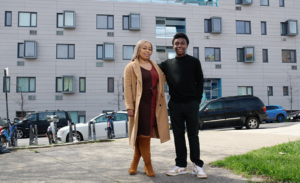Working with our coalition partners, Habitat NYC secured major changes to Intro 2166A-2020, which passed City Council earlier this year. The bill saved more than 5,000 homeowners from potential disaster and charts a course to a future without predatory tax lien sales, and towards a more equitable municipal debt collection system that preserves affordable housing and stabilizes Black and brown neighborhoods.
What is a tax lien sale? When a homeowner or building owes municipal debt – such as late property taxes or an unpaid water bill – the City can sell that debt to a private collector, thus collecting a fraction of the debt. The private debt collector then often charges the homeowner exorbitant interest, which creates a situation where the homeowner or building can never escape the ballooning debt.
New York City’s tax lien sale system disproportionately impacts communities of color. The City was six times more likely to sell liens on one-to-three family homes in majority Black neighborhoods and twice as likely to sell liens in majority Latinx neighborhoods than in majority white neighborhoods. For decades, Mayors and City Councils renewed this predatory practice with few or no questions asked.
Until now.
While we celebrate our win with our partners, we know that this bill is only one step toward a more equitable and fair taxation collection system for our city.
The bill passed by City Council:
- reauthorizes New York City’s tax lien sale for one year rather than four and permits the fewest liens to be sold on small homes in history
- exempts over half of one-to-three family homes, condos, and co-ops that have been included in the past by raising the threshold for eligibility for the lien sale from $1,000 to $5,000
- excludes owners of properties with fewer than ten units who declare that they have experienced financial hardship due to COVID-19
- includes one million dollars in new funding for lien sale outreach for community based and nonprofit organizations
These are important, hard-negotiated changes, and we take a moment to celebrate them, but there is more work to do.
Most importantly, the bill requires the Mayor and Speaker of the City Council to appoint a Task Force to explore a more equitable replacement system of debt collection involving the transfer of properties with liens to “community land trusts, land banks, mutual housing associations or other similar entities.” Recommendations to advance fairness and equity in the system could then be further incorporated when the lien sale authorization expires next year.
When we decided to fight against the predatory tax-lien system, Habitat NYC and our coalition partners never thought we would be advocating against this system in a global pandemic. At the height of NYC’s COVID-19 response, the City was prepared to sell 5,315 liens for single family homes. Together with our partners our tax lien campaign protected these families from being further destabilized, for now.
Looking ahead, we turn our attention to creating a permanent fix, a more equitable system of debt collection that strengthens our city without targeting communities of color and that preserves homeownership in underserved communities that have suffered from racist housing policies for generations.
Onward.
